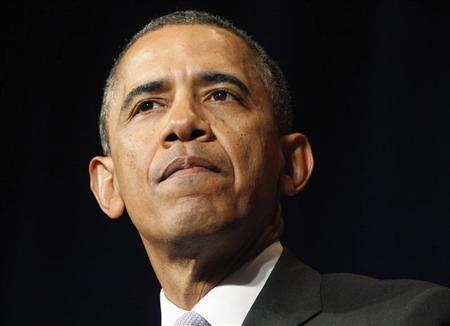WASHINGTON - U.S. President Barack Obama told Russian President Vladimir Putin on Saturday that Moscow's deployment of Russian forces into Crimea is a clear violation of Ukraine's sovereignty and warned of greater economic and political isolation if they are not withdrawn.
The White House said Obama and Putin spoke by phone for 90 minutes, their second phone call in the past eight days over Ukraine, an escalating crisis that is presenting a new challenge to already strained U.S.-Russian relations.
The United States called on Russia to de-escalate tensions by withdrawing its forces back to bases in Crimea and to refrain from any interference elsewhere in Ukraine. Based on the Russian version of the phone call, Putin gave no ground, saying Moscow reserved the right to protect its interests and those of Russian speakers in Ukraine if they come under threat.
"The United States condemns Russia's military intervention into Ukrainian territory," the White House said in a statement outlining what was discussed in the phone call.
"President Obama expressed his deep concern over Russia's clear violation of Ukrainian sovereignty and territorial integrity, which is a breach of international law," it said.
In an initial signal of its displeasure, the White House said the United States will suspend participation in preparatory meetings for a G8 summit in Sochi, Russia.
Officials have already warned it would be hard for Obama and European leaders to attend the June summit in the home of the Winter Olympics due to the Russian aggression in Ukraine.
Obama canceled a visit to Moscow last September to protest Putin's refusal to help rein in Syrian President Bashar Assad although Obama did attend a G20 summit in St. Petersburg.
The White House raised the possibility of sanctions, saying that "going forward, Russia's continued violation of international law will lead to greater political and economic isolation."
Defense Secretary Chuck Hagel told his Russian counterpart Sergei Shoigu in a phone call that Moscow's military intervention risked an escalation "that would threaten European and international security," the Pentagon said.
A U.S. defense official said there had been no change in the alert status of U.S. military forces. Another U.S. official said the focus is on diplomatic options.
Obama also held separate calls with French President Francois Hollande and Canadian Prime Minister Stephen Harper about Ukraine.
The three leaders agreed to coordinate closely together and through international organizations, and "affirmed the importance of unity within the international community in support of international law and the future of Ukraine and its democracy," the White House said.
At an emergency meeting of the U.N. Security Council, U.S. Ambassador to the United Nations Samantha Power called for the swift deployment of international monitors to Ukraine to help stem the escalating crisis.
Obama urges dialogue
In the phone call, Obama told Putin that Russian concerns about the treatment of ethnic Russian and minority populations in Ukraine should be addressed "peacefully through direct engagement" with Ukraine through international channels.
He urged an immediate effort to initiate a dialogue between Russia and the Ukrainian government with international mediation as needed. "The United States is prepared to participate," the White House said.
Obama warned that Russia's move in Ukraine "would negatively impact Russia's standing in the international community," it said.
U.S. officials in coming hours and days will urgently consult with allies and partners in the U.N. Security Council, the North Atlantic Council and the Organization for Security and Cooperation in Europe.
Secretary of State John Kerry spoke by phone with acting Ukrainian President Oleksander Turchinov on Saturday, a State Department official said.
The crisis began in November after Viktor Yanukovich, Ukraine's pro-Russian president who has since been deposed, triggered protests by spurning a political and trade deal with the European Union.
Obama is under pressure from Republicans to take stern measures to respond to Putin's move.
Republican Senator John McCain of Arizona, a sharp Putin critic, called on Obama on Saturday to swiftly articulate the costs to Russia for the aggression and "take steps urgently to impose them."
"Every moment that the United States and our allies fail to respond sends the signal to President Putin that he can be even more ambitious and aggressive in his military intervention in Ukraine," McCain said.
Another leading Republican Senator, Bob Corker of Tennessee, called on Obama to lead an international response that could include sanctions.






















































